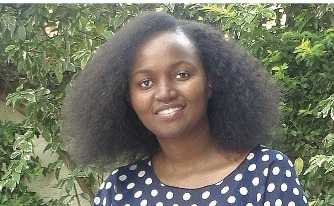Lorna Muthamia-Ochido Passionate Speech Language Therapist

April is the Autism Awareness Month and is celebrated all over the world to highlight the growing need for awareness about the disorder. One of the effects of autism is difficulty in communication. However, most people with autism can learn to use language through speech therapy. Lorna Muthamia-Ochido, a speech and language therapist, talks to ESTHER KIRAGU on her resolve to help people with communication disorders as well as the scope of her profession.
Lorna Muthamia-Ochido is the founder and senior speech-language therapist at the Centre for Child Development and Education (CCDE). The centre is the largest private speech therapy provider in Kenya.
“My clients are diverse ranging from18-month-olds who are late in talking, pre-schoolers who stammer, infants with sucking/swallowing difficulties, school-age children with dyslexia or difficulties making sufficient reading progress to children with a variety of diagnosed conditions such as Down syndrome and autism spectrum disorder among others,” she explains.
Lorna, a mother of two, specialises in children between zero to 16 years who have difficulty in speech articulation, voice or fluency, difficulty in comprehending or expressing language, learning and literacy, in addition to overall communication difficulties.
Career in speech therapy…
Lorna’s motivation to pursue a career in speech therapy was spurred by the challenges her family faced when, in 1998, her youngest sister, then four years old, was diagnosed with a hearing impairment. Doctors recommended speech therapy.
“As a child, my sister was often sick and under a myriad of strong prescription drugs, which unfortunately triggered a hearing impairment. At the time when the diagnosis was made there was only one speech therapist in Kenya based in Nairobi and we lived in Mombasa. Logistically, accessing the therapist for medical care was a nightmare,” she recounts.
Curious to learn more about speech therapy, which purported to optimise speaking outcomes for children with hearing impairment, Lorna decided to pursue a Bachelor’s in Communication Disorders (speech and language therapy) at the University of Canterbury in Christchurch, New Zealand. She graduated and is a registered member of Speech Pathology Australia (MSPA).
“My sister joined me in Australia and also New Zealand to seek medical care and successfully developed speech and language. She is now 21years old and independent,” says Lorna who recognises the outcomes would have been different for her sister if she hadn’t accessed specialist educational services as well as consistent speech therapy.
Lorna, who lived and worked overseas for 13 years, explains that there is a lot more that speech therapists/pathologists do than just work on speech since they have been trained to assess people with communication disorders, which vary from speaking, comprehension, reading and writing, or swallowing difficulties. The training encompasses all aspects of communication including articulation/pronunciation, pitch, fluency/stammering and volume, language comprehension and expression, and literacy. Unfortunately, there are currently no university programmes in Kenya offering this course.
When Lorna returned to Kenya, she set up the Centre for Child Development and Education in Nairobi in 2011 to cater for speech therapy needs. For the last four years, she has been creating awareness about the benefits of seeking speech therapy services early, and empowering parents to equip themselves with the skills needed to improve their children’s communication skills.
Lorna offers consultations as well as one-on-one therapy sessions at the centre and other satellite clinics around Nairobi. She also runs teletherapy sessions (online) for clients who live outside Nairobi, in addition to organising workshop-training programmes for teachers and parents. On average the centre attends to at least 400 children a month on a one-to-one basis.
Communication problems with autism…
Lorna says she attends to many children who have been diagnosed with autism spectrum disorder (ASD). It is commonly known that many parents use eye contact as one of the key features to assess whether their child has ASD and this, according to Lorna, can be misleading as people with ASD have varying features or difficulties depending on whether they are severely or mildly affected. The difficulties vary from social, communication and language problems.
“Some of the communication and language problems children with ASD may have include difficulty following instructions, trouble with conversational skills which include eye contact and gestures, difficulty in understanding and using words and also difficulty in learning how to read and write,” she explains adding that in Kenya, there is no standard procedure for diagnosing children with ASD.
Her encouragement to parents who have children with delayed language skills at two years of age is to consult with a speech-language therapist and if they suspect their child displays features consistent with ASD to also see a paediatric neurologist. She urges parents to act early as early intervention holds the key to optimising communication outcomes not only for children with autism, but also for all children with speech and language difficulties.
During this year’s Autism Awareness Month, Lorna appeals to the society to equip itself with credible information about autism, dispel myths and take action towards assisting people with the disorder to develop skills that will see them learn how to communicate and make better sense of the world around them.
A wife and a parent herself, Lorna is passionate about parenting, early intervention and empowering parents and teachers. Some of her special areas of interest include early intervention, hearing impairment and literacy.
“I urge parents to take time to improve their parenting skills so that there can be an overall reduction in language delays currently being witnessed in children. In addition, they should strive to make the home environment language-rich, increase the number of quality interactions they have with their children, read more to children and reduce the amount of time their children are exposed to television,” she says in conclusion.
Lorna can be reached at
Website – www.speechtherapytotos.com
Facebook : Speech Therapy Totos (www.facebook.com/speechtherapytotos)
Tel: +254 788 700078 or +254 728 663136
Email: [email protected]
Published in April 2015




